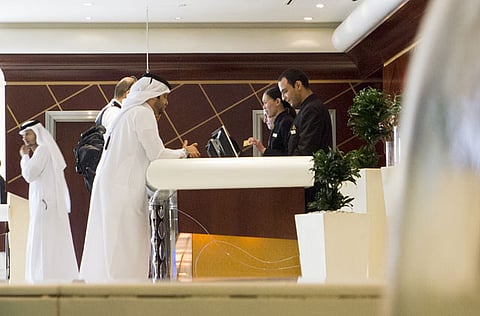Dubai’s hotel rates hit a 3-year high on Expo 2020 lift
Hotel occupancy rates in October stood at nearly 82 per cent

Dubai: Dubai’s hotel industry reported its highest monthly room rates since 2018, lifted by the opening of Expo 2020, according to STR.
Hotel occupancy rates in October stood at nearly 82 per cent, with the average daily rate (ADR) at Dh776. Revenue per available room (RevPAR) – a performance metric used in the industry - during the month was Dh633.66.
“The market’s absolute ADR and RevPAR levels were the highest for any month since January 2018 and February 2018, respectively, while the occupancy level was the highest since January 2020,” said STR in a statement.
The Expo, which is expected to bring in 25 million visitors during a 6-month long period, has already reported around 3 million visits since opening up to the public on October 1.
Return of Europe
Travelers are once again flying to Dubai from major markets in Europe due to the lifting of COVID-19 restrictions.
“I’m not sure how many people are coming just for the Expo, but they’re coming and the Expo is a nice add on to have,” said Simon Allison, CEO of Hoftel, a global association for hotel real-estate investors.
“If you look at that market, a lot of people didn’t have a summer holiday this year - right now, if you’re in Europe and you want some sunshine, it’s the Canary Islands or it’s GCC,” said Allison.
Managing costs
During the pandemic, Dubai’s hotels became experts at managing costs as they had to rely solely on the domestic staycation market.
“It got to the point where hotels in this region could break even at 20-30 per cent occupancy and now they have cut the staffing model significantly,” said Allison. “There’s a risk of staff shortage and for hotel operators there’s the risk of escalating costs, with managers raising staffing levels back to where they were in 2019”
Business travel
The return of events and conferences in UAE shows that business travel is back in small pockets. The Dubai Air Show – this year’s largest aviation and aerospace event – along with Abu Dhabi’s flagship oil conference ADIPEC will be held next week and thousands of participants are expected to visit.
Hoftel, which is organizing this year’s Gulf and Indian Ocean Hotel Investors’ Summit, will not see participants flying in from several countries, partly due to cuts in corporate travel budgets.
“Normally, we’ll have people from Singapore, Australia, Kenya, and Uganda - we’re not getting those,” said Allison.
The hotel industry veteran added that large conventions, which can’t be replaced with virtual calls, will return much faster. “People are actually desperate to meet face-to-face in bigger formats,” said Allison.
“What will suffer permanently is the small internal corporate meetings that require employees to take short flights to meet their colleagues” said Allison. “That’s a chunk of the meeting market that will never come back.”
Sign up for the Daily Briefing
Get the latest news and updates straight to your inbox







